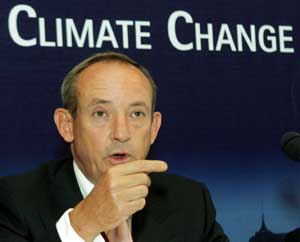UN climate change talks bring "convergence" but no agreement
 Bonn - The UN's head of climate change Yvo de Boer said Wednesday that talks in Bonn had brought a degree of "clarity and convergence" to the process of drawing up new global climate change commitments by the end of 2009, although the ten-day talks brought few tangible advances.
Bonn - The UN's head of climate change Yvo de Boer said Wednesday that talks in Bonn had brought a degree of "clarity and convergence" to the process of drawing up new global climate change commitments by the end of 2009, although the ten-day talks brought few tangible advances.
Industrialised countries were not able to agree on common goals for emission reduction at the talks in the former German capital, which are the first in a series of meetings paving the way to a replacement of the Kyoto Protocol.
More than 2700 delegates from 180 countries had gathered to kick- start negotiations on new commitments to be signed off at a UN summit on climate change in Copenhagen this December.
"If this were a marathon I think I'd say the runners were gathering their stamina for the final sprint," de Boer said of the talks.
Following the Bonn discussions, the UN Climate Change Convention (UNCCC) aims to draw up a draft document in time for the next meeting in June.
The UN head of climate change said success in Copenhagen depended on establishing four main pillars of agreement.
De Boer said the four key areas were clarity on reduced emission targets for industrialised countries, clear targets for developing countries to limit their growth in emissions, financial commitments for developing countries to reach these targets and clear government structures to finance and oversee climate change policies.
The United States' commitments are considered key to negotiations, after a recent change of environmental policy under the new US administration.
US President Barack Obama is committed to tackling climate change, after his predecessor George W. Bush had refused to sign the Kyoto Protocol.
"Expectations have been lifted by the presence of the US," de Boer said, adding that America's opening statements at the Bonn talks were met with applause.
To date however, Obama's fledgling administration has not made any specific pledges.
"We're still waiting for the USA to put its position on the table. It's been asking us, please keep the door open, and of course the door does stay open," the UNCCC's Michael Zammit Gutajar said.
Negotiations are currently taking place in two parallel forums, one which includes the Kyoto Protocol signatories, and the other which brings together all signatories of the UNCCC.
Harald Dovland, who heads up the Kyoto Protocol group, made it clear the two teams could not work in isolation, saying it was "not a big secret" that several parties in his group wanted to know what the UNCCC signatories - including the US - were coming up with.
Michael Zammit also called for more scientific research to back up targets set by the International Panel on Climate Change (IPCC), which says that by the year 2020, emissions need to be cut by 25 to 40 per cent in relation to 1990 figures.
The IPCC's research suggests this reduction could keep global temperatures within 2 per cent of their current range, but countries are expected to haggle over these targets in the months leading up to December's Copenhagen summit.
The European Union has expressed its commitment to these reductions, while Obama has said he is prepared to reduce emissions to 1990 levels by the year 2020.
Many developing countries say they are unable to harness their emissions without technical and financial assistance from industrialised nations, who in turn are reluctant to make such commitments.
De Boer made it clear that there would be no advances if developed countries were not prepared to pledge financial assistance, not just to cut back on emissions but also for developing countries to adapt to the consequences of climate change, such as flooding or desertification.
Meanwhile, environmental groups appealed to governments to tackle climate change at the highest level, seizing the economic crisis as an opportunity to invest in green technologies. (dpa)